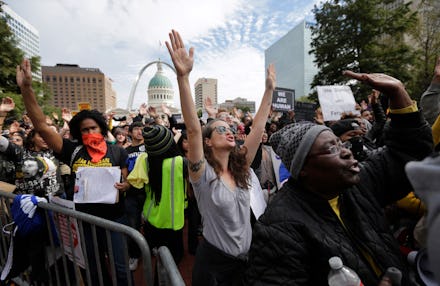Ferguson Grand Jury Leaks Risk Everyone's Right to Fair Trial

This is a guest post by Mark Kogan, a lawyer in Washington, D.C. His academic publications include legal commentary on lawyers' speech, fair trial and the First Amendment.
The shooting death of Michael Brown by Ferguson, Missouri, police officer Darren Wilson is back in the news again, as a series of highly sensitive details from ongoing grand jury proceedings have been leaked to the press. Now, as both sides scramble to address information that was not meant to be public, the media and courts have to figure out how to deal with this significant violation of due process rules.
The information at the center of the debate comes from a series of high-level leaks from within the grand jury proceedings — proceedings that are supposed to be kept secret and confidential. The newly revealed details lay out inside facts, including autopsy reports and testimony, which has many concerned about their potential influence on public opinion concerning the case.
On Wednesday, the Department of Justice informally condemned the leaks, with an anonymous DOJ official telling the Los Angeles Times that they found the leaks "irresponsible and highly troubling," and that "there seems to be an inappropriate effort to influence public opinion about this case." On Thursday, CBS News reported that Attorney General Eric Holder told colleagues that he was "exasperated" by the leaks and the "selective flow of information coming out of Missouri."
Concern about the leaks comes primarily from the Brown family's camp and supporters, as the majority of the information appearing in the press seems to corroborate the narrative heard from the defense, namely that Brown attacked Wilson in his vehicle, catalyzing the exchange that resulted in in Brown's death.
The highly sensitive nature of the information contained in the leaks, coupled with the somewhat cryptic disclosure from members of the press, greatly narrows the scope of potential leakers to the respective attorneys and staff involved in the proceedings.
Legal analysts and commentators have been speculating as to the source and intent of the leaks ever since they first made headlines on Monday. Some are arguing that the release of information is an attempt by Wilson's attorney to push public opinion in Wilson's favor and force the grand jury's hand not to indict. Others, like Mic's Gregory Krieg, take an even more cynical approach, arguing that the prosecutor's office is leaking this information to soften the public reaction to a decision not to bring charges against Wilson.
Regardless of the source and the intent behind it, leaks like this are harmful and counterproductive to the integrity of the judicial process. While one can appreciate the role of the media in providing sensitive information and lifting the veil of secrecy, the media must use discretion when publicizing information meant to be secret in order to ensure and protect the fairness of judicial proceedings.
However, the media isn't the only entity expected to exercise ethical judgment in this situation. In fact, if the source of information is a lawyer involved with the case, the implications are more than ethical — they are legal.
The judiciary has historically taken a very strong stance on the conflict between the freedom of the press and the right to a fair trial. As far back as 1907, the Supreme Court wrote that "the theory of our system is that the conclusions to be reached in a case will be induced only by evidence and argument in open court, and not by any outside influence, whether of private talk or public print." In 1966, Chief Justice Warren Burger echoed that sentiment, arguing that "collaboration between counsel and the press as to information affecting the fairness of a criminal trial is not only subject to regulation, but is highly censurable and worthy of disciplinary measures." In 1991, the Supreme Court reaffirmed that stance, holding that it was both constitutional and necessary to limit attorney's speech if that speech had a substantial likelihood of materially prejudicing litigation.
The judiciary's harsh stance on leaks likely explains why the leakers in the Ferguson case have remained anonymous, but that is no excuse. The media should reveal the source of these leaks if they are attorneys involved with the proceedings, either to the public or to the judiciary. Failure to do so would reward lawyers attempting to use the court of public opinion to influence proceedings in a way that violates both Wilson's and the Brown family's constitutionally protected right to a fair trial.
Although it provides a fascinating look into the ongoing grand jury proceedings surrounding the Michael Brown shooting, the leaked information risks the right to fair trial for all parties involved and must be met with swift and strong action. Members of the press should reveal the source of these leaks either publicly or to the relevant judicial authorities, in order to hold them accountable and help the courts protect the integrity of the judicial process. If the leakers believe making this information public is worth the risk to the right to a fair trial, then they should be made to stand behind their position publicly.